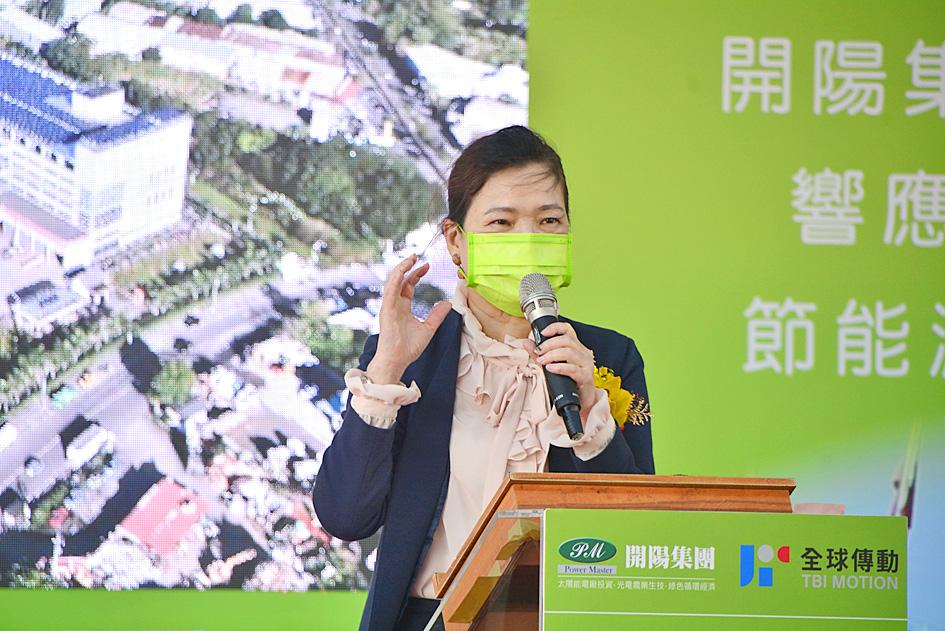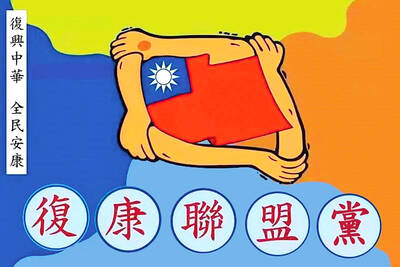CPC Corp, Taiwan’s (台灣中油) third liquefied natural gas (LNG) terminal project in Taoyuan would have “a minimal impact” on algal reefs and endangered marine species at the planned construction site, Minister of Economic Affairs Wang Mei-hua (王美花) said yesterday.
The terminal — to be built in the Guantang Industrial Park (觀塘工業區) on the coast of Datan Borough (大潭) in Taoyuan’s Guanyin District (觀音) — is sorely needed to maintain stable power supply, Wang said.
Some environmentalists have argued that the terminal would damage algal reefs off Taoyuan.

Photo: CNA
Wang said that the footprint of the planned terminal has been reduced to 10 percent of the original plan proposed under the previous Chinese Nationalist Party (KMT) administration and avoids some sensitive algal reefs.
“We have done our best to preserve the algal reefs, including positioning the entry terminal 1km from the shore,” Wang said.
The swift construction of the LNG terminal is essential to ensuring stable power supply, especially with the Guosheng Nuclear Power Plant shutting down six months earlier than expected due to a lack of storage space for used fuel rods, she said.
The nuclear power plant in New Taipei City’s Wanli District (萬里) has a license to operate until the end of this year, but according to the Atomic Energy Council, the pools where the used fuel rods are stored are “insufficient,” and the power plant would be working at 80 percent capacity before ceasing operations in June.
Describing the early shutdown as something that “cannot be helped,” Wang said the government is making up for the shortfall in electricity by accelerating efforts to switch to natural gas and renewable energy.
Wang was speaking at the inauguration of a rooftop solar system in New Taipei City’s Shulin Industrial Park (樹林產業專區), the largest rooftop solar system in the greater Taipei area.
She praised the system as a “great example” of rooftop solar development, which can reduce temperatures at factories while providing energy.
“We are encouraging more industrial users to install rooftop solar energy systems in northern Taiwan,” Wang said, adding that the north is lagging behind the south in solar installations.
“Our economy is growing well and we need stable growth in electricity supplies to support it,” she said.
Asked about a water shortage, Wang said that businesses should “assume the worst.”
“We can probably expect the 7 to 11 percent reduction in water consumption for industries to remain in place until the wet season begins in May or June,” she said.

AIR DEFENSE: The Norwegian missile system has proved highly effective in Ukraine in its war against Russia, and the US has recommended it for Taiwan, an expert said The Norwegian Advanced Surface-to-Air Missile Systems (NASAMS) Taiwan ordered from the US would be installed in strategically important positions in Taipei and New Taipei City to guard the region, the Ministry of National Defense said in statement yesterday. The air defense system would be deployed in Taipei’s Songshan District (松山) and New Taipei City’s Tamsui District (淡水), the ministry said, adding that the systems could be delivered as soon as the end of this year. The US Defense Security Cooperation Agency has previously said that three NASAMS would be sold to Taiwan. The weapons are part of the 17th US arms sale to

SERIOUS ALLEGATIONS: The suspects formed spy networks and paramilitary groups to kill government officials during a possible Chinese invasion, prosecutors said Prosecutors have indicted seven retired military officers, members of the Rehabilitation Alliance Party, for allegedly obtaining funds from China, and forming paramilitary groups and assassination squads in Taiwan to collaborate with Chinese troops in a possible war. The suspects contravened the National Security Act (國家安全法) by taking photos and drawing maps of key radar stations, missile installations and the American Institute in Taiwan’s headquarters in Taipei, prosecutors said. They allegedly prepared to collaborate with China during a possible invasion of Taiwan, prosecutors said. Retired military officer Chu Hung-i (屈宏義), 62, a Republic of China Army Academy graduate, went to China

INSURRECTION: The NSB said it found evidence the CCP was seeking snipers in Taiwan to target members of the military and foreign organizations in the event of an invasion The number of Chinese spies prosecuted in Taiwan has grown threefold over a four-year period, the National Security Bureau (NSB) said in a report released yesterday. In 2021 and 2022, 16 and 10 spies were prosecuted respectively, but that number grew to 64 last year, it said, adding that the Chinese Communist Party (CCP) was working with gangs in Taiwan to develop a network of armed spies. Spies in Taiwan have on behalf of the CCP used a variety of channels and methods to infiltrate all sectors of the country, and recruited Taiwanese to cooperate in developing organizations and obtaining sensitive information

BREAKTHROUGH: The US is making chips on par in yield and quality with Taiwan, despite people saying that it could not happen, the official said Taiwan Semiconductor Manufacturing Co (TSMC, 台積電) has begun producing advanced 4-nanometer (nm) chips for US customers in Arizona, US Secretary of Commerce Gina Raimondo said, a milestone in the semiconductor efforts of the administration of US President Joe Biden. In November last year, the commerce department finalized a US$6.6 billion grant to TSMC’s US unit for semiconductor production in Phoenix, Arizona. “For the first time ever in our country’s history, we are making leading edge 4-nanometer chips on American soil, American workers — on par in yield and quality with Taiwan,” Raimondo said, adding that production had begun in recent